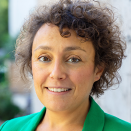Panel Discussion
In four years, the MENA region seems to have turned its back on the democratic aspirations that characterized the 2011 wave of popular uprisings and is instead heading toward a spiral of fragmentation, insecurity, and fragility. Today’s volatile environment has resulted in a fierce competition for power between regional and international actors who have undertaken significant efforts to influence the developments in the region in their own interest. In addition to a broader analysis of the geopolitical power shifts in the region, the panel discussion focused particularly on the roles and interests of the important regional players – Turkey, Iran, and Saudi Arabia – and how their policies are helping or hurting the stability in the region.
The panel consisted of four experts, Kristina Kausch, head of the Middle East and North Africa Program at FRIDE (Fundación para las Relaciones Internacionales y el Diálogo Exterior, Madrid); Soli Özel, professor of international relations at Kadir Has University (Istanbul) and a current Richard von Weizsäcker Fellow at the Robert Bosch Academy (Berlin); Behnam Ben Taleblu, an independent Iran analyst from Washington DC, and Sebastian Sons, program officer in the Middle East and North Africa Program at the DGAP (Berlin). Participants examined the new dynamics in the region as well as specific strategies and interests guiding the foreign policies of Turkey, Iran, and Saudi Arabia to assess the political implications of these policies for the countries themselves, the region, and Germany/the EU.
There was broad consensus that the new relations and dynamics in the MENA region have fundamentally changed what once appeared to be written in stone. Almost everything is now up for potential (re-)negotiation. While “revisionist players” like Turkey and Iran pursue an expansionist regional agenda, other countries such as Saudi Arabia focus on promoting and preserving the status quo domestically and regionally, exerting a counter-revolutionary influence. Participants emphasized that it is not just state actors who compete in reordering the Middle East. Non-state actors, most prominently the so-called Islamic State (ISIS), are fundamentally challenging established borders and the concept of nation states as such in the region.
The competition for regional hegemony between Iran and Saudi Arabia was identified as one of the most crucial destabilizing factors in the region. There was broad agreement that a solution to the Syrian crisis and a stabilization of the region would prove extremely difficult if not impossible without the engagement of these two countries – even though the “cold war” between them shows no signs of thawing. The nuclear deal with Iran burdens the strained relationship between the two countries even more, as it has shifted the balance and strengthened Iran’s position in the region. Panelists agreed that controlling the matter of who benefits from the sanction relief is a great challenge. So is developing a joint action plan for Syria that ensures each country’s interest.
While Iran and Saudi Arabia have seen great continuity in their foreign policies, with only minor strategic changes of course over the years, the direction of Turkey’s foreign policy will depend significantly on the outcome of the Turkish elections on November 1. After the failure of Turkey’s foreign policy motto “zero problems with neighbors” of the past years, it is expected that Turkey will reconcile and reestablish its strategic alignments in the region, particularly with Israel, due to a mutual concern about possible Iranian expansion. In addition, participants said it was necessary to rethink and re-forge EU-Turkey relations.
The current power struggles have crushed democratization efforts in the region and have shifted Western priorities away from supporting democratization processes to simply managing a series of increasingly critical crises. Participants strongly criticized Europe’s foreign policy and handling of the crisis as ineffective and insufficient. They underlined the need for ad hoc multilateral coalitions in addition to institutional multilateralism, for the changing nature of security threats in the MENA region requires broader actions. They emphasized the importance of and dependence on the collaboration of key regional actors, while stressing how crucial it is to carefully evaluate the ultimate goals of potential partners.
About 25 guests from German ministries, embassies from the MENA region, think tanks, and relevant German institutions attended the September 18 event. It was organized as part of the FRIDE research project “Geopolitics and Democracy in the Middle East and North Africa” with the kind support of HIVOS and the Norwegian Ministry of Foreign Affairs.
The panelists were:
Kristina Kausch, Head, Middle East and North Africa Programme, FRIDE (Madrid)
Soli Özel, Professor of International Relations, Kadir Has University (Istanbul); Richard von Weizsäcker Fellow, Robert Bosch Academy (Berlin)
Behnam Ben Taleblu, Independent Iran Analyst (Washington)
Sebastian Sons, Program Officer, Middle East and North Africa Program, DGAP (Berlin)
Welcome and Chair: Dina Fakoussa, Head of Program Middle East and North Africa, DGAP (Berlin)
